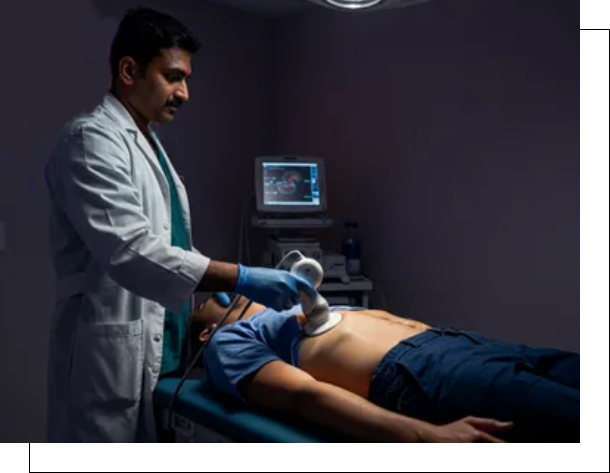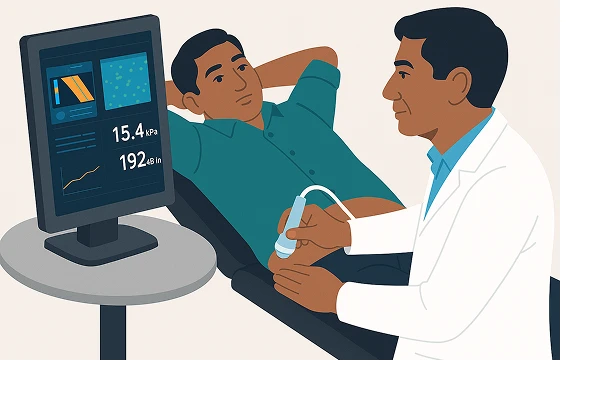Liver Biopsy
A liver biopsy is a procedure used to collect a small tissue sample from the liver to evaluate its health. It helps in diagnosing liver diseases such as cirrhosis, hepatitis, and liver cancer. The biopsy helps doctors assess the extent of damage and plan appropriate treatments.
This helps diagnose various liver conditions, including:
 Hepatitis
Hepatitis Cirrhosis
Cirrhosis Fatty liver disease
Fatty liver disease Liver fibrosis (scarring)
Liver fibrosis (scarring)
Types of Liver Biopsy
Percutaneous Liver Biopsy
A needle is inserted through the skin to obtain a tissue sample, which is typically done under local anaesthesia, guided by ultrasound or CT imaging to ensure precision.
Transjugular Liver Biopsy
In this procedure, the needle is inserted through a vein in the neck (jugular vein) to access the liver. This approach is usually preferred for patients with clotting disorders or ascites (fluid buildup in the abdomen), where a percutaneous biopsy may be riskier.
Laparoscopic (Surgical) Liver Biopsy
Liver biopsy laparoscopic surgery (a small tube with a camera) is used to guide the biopsy needle during a minimally invasive surgery. This type is often used when doctors need a more direct view of the liver or when other biopsies are not suitable.
Endoscopic Ultrasound-Guided Liver Biopsy
Liver biopsy with ultrasound uses an endoscope equipped with ultrasound capabilities to direct the biopsy needle to the liver. It combines endoscopy with ultrasound to get a precise tissue sample, often used with other techniques for deeper liver lesions that are hard to reach.
Book An Appointment
Why You May Need a Liver Biopsy
A liver biopsy can provide valuable information about
Diagnose liver cancer or other conditions
Assess liver inflammation type and severity of liver damage
Check unexplained liver enzyme levels
The cause of liver dysfunction
The need for treatment
Monitor your treatment progress

Process
A liver biopsy is usually performed on an outpatient basis.
You might be advised to fast beforehand. Anaesthesia (local or general) is administered for comfort.
Using ultrasound guidance, a thin needle is inserted through your skin (percutaneous) and into your liver to collect the tissue sample.
After the procedure, you’ll be monitored for a few hours before discharge.
Fibroscan
Fibroscan is a non-invasive, painless test that uses sound waves to measure liver stiffness. Increased stiffness can indicate liver fibrosis or cirrhosis.
Purpose of Fibroscan
Fibroscan offers a safe and convenient way to:
Assess liver health
Diagnose chronic liver diseases like Hepatitis C, Hepatitis B, and fatty liver
Monitor disease progression
Guide treatment decisions
Benefits of Fibroscan
There are some benefits of fibroscan thoseare discussed below:

Procedure
A Fibroscan is a simple outpatient procedure:
No special preparation is required.
A probe is gently placed on your skin over your liver. Sound waves are transmitted to measure stiffness.
Results are available immediately for your doctor to interpret.
Getting Your Test Done
Our clinic offers both tests with experienced specialists. We use state-of-the-art equipment for accurate liver biopsy and liver fibroscan tests in Kolkata and results.
FAQs
Know Your Answers
Is liver biopsy painful?
A liver biopsy is done under local anaesthesia, so it’s not painful, but you may feel some discomfort.
How long does a liver biopsy take?
The procedure typically takes about 15 to 20 minutes. Recovery time is usually quick, though monitoring lasts for about an hour. You may also experience mild discomfort or pain at the biopsy site.
Can a fibroscan replace a liver biopsy?
Yes, in many cases, Fibroscan can be used to assess liver health and fibrosis instead of a biopsy.
Who is a good candidate for a Fibroscan?
Fibroscan is suitable for most people with suspected liver disease.
Where can I get a liver biopsy or Fibroscan in Kolkata?
Visit our clinic for accurate and timely Fibroscan and biopsy tests for the liver in Kolkata done under qualified healthcare providers.

